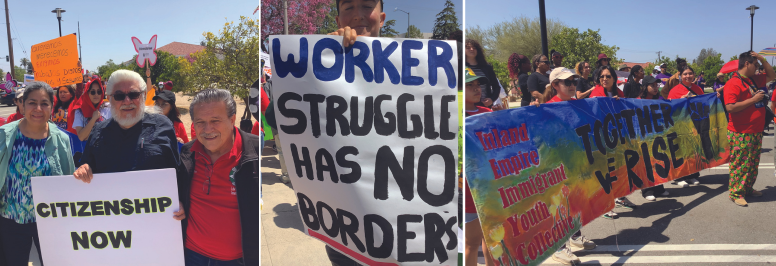May Day, which commemorates the historic struggles and gains made by workers and the labor movement, was observed on May 1 by the Diocesan Office of Hispanic Affairs and Office of Community Services and Outreach Programs. The two offices joined workers from across the Inland Empire for a march in the City of Fontana, asking for recognition of the contributions immigrant workers make to the economy. They also expressed the need for job equality and safety.
“Many young people carried signs, concerned about the future of work, about finding sources of work that respect workers’ rights and also protect the Environment,” said Petra Alexander, Director of the Diocesan Office of Hispanic Affairs. “Pope Francis has told us that young people are very concerned about the precariousness of the work that is offered, and he refers to short contracts that do not allow them to plan their lives, low incomes and the acceleration of the market that makes the relationship with work seems overwhelming, in its haste and completion as well as in pollution and damage to the environment.”
May Day is also known as International Workers Day, which is intended to celebrate laborers around the world. The activists who participated in the May Day march in Fontana aimed to bring attention to the issues involving Inland Empire workers, including the rights for warehouse workers as more and more warehouses are being built in the area. The activists called for immigrant rights, criminal justice reform and rights of street vendors to sell their products, a current prevalent issue in the City of Fontana.
“My favorite part of this walk was the speeches,” said Teresa Rocha, Director of the Office of Community Services and Outreach Programs. “They were inspirational for the cause, advocating at the local, state, and national level. Another favorite part was connecting with the people and encouraging them to continue advocating for the needs of the worker because every worker is a child of God.”
Rocha felt participation in the march was paramount to honor one of the seven themes of Catholic Social Teaching, “The Dignity of Work and the Rights of Workers.” This theme states that, “Work is more than a way to make a living; it is a form of continuing participation in God’s creation. If the dignity of work is to be protected, then the basic rights of workers must be respected--the right to productive work, to decent and fair wages, to the organization and joining of unions, to private property, and to economic initiative.”
“Many of the organizations supporting this day work tirelessly throughout the year promoting and advocating for the rights of every worker especially those who are in the margins, undocumented, farm workers, home care services and others,” Rocha said. “We join because as Christians we are called to be on the side of the poor and vulnerable.”
Alexander attended the May Day march in addition to witnessing many young adults participating in the walk, the large female presence.
“Working women are reported to be exposed to frequent abuse, whether in services or in private jobs, such as women who clean houses or care for others at home,” Alexander said.
Alexander spoke with two women, Beira Orellana and Lucía Aguilar, at the walk who are parishioners of Our Lady of the Rosary Cathedral Parish in San Bernardino. Both women told Alexander that it was important for them to show up to the march and be a voice for women’s fair wages and labor rights.
Aguilar is a member of The Coalition for Humane Immigrant Rights (CHIRLA) organization, and said she regrets that there are women who arrive too late to ask for help, sometimes they suffer humiliation, risks, harassment and lack of fair pay.
“If women would have the support of a group, they would feel strong,” said Mireya Suárez, CHIRLA’s organizer from San Bernardino. "They would organize some proposal, they would encourage each other, because that is why we are united, to give us the courage to believe in our dignity.”


